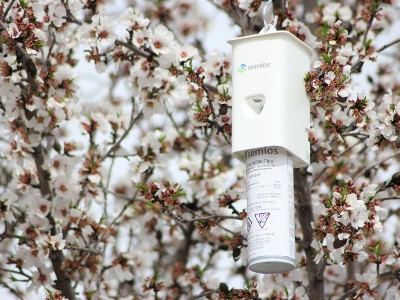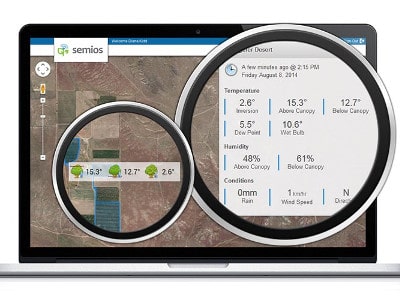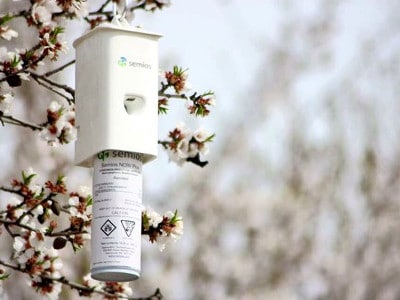
 Vancouver-based Semios, a provider of agricultural precision pest management technology, has received approvals from both the Environmental Protection Agency (EPA) and the California Department of Pest Regulation (DPR) for their aerosol pheromone biopesticide products aimed at disrupting the mating habits of the Navel Orangeworm.
Vancouver-based Semios, a provider of agricultural precision pest management technology, has received approvals from both the Environmental Protection Agency (EPA) and the California Department of Pest Regulation (DPR) for their aerosol pheromone biopesticide products aimed at disrupting the mating habits of the Navel Orangeworm.
The patented Semios platform monitors the quantity of pests, along with flight strength, wind patterns and temperature to optimize pheromone deployment in the field, all through a single interface that a farmer can easily control.
“The Navel Orangeworm pest causes significant loss of crop and revenue in the California almond and pistachio industries and it’s getting worse every year,” said Semios Founder and CEO Michael Gilbert. “The Semios NOW pheromone aerosol formulas give farmers the ability to reduce and control pest populations and, as a result, significantly reduce crop damage. The Semios pheromone aerosol dispenser is part of a custom designed controller and sensor network that gives farmers decision-making tools and remote access to the field conditions in real-time all day, every day.”
Pheromones are a naturally occurring means of communication between insects, and are species-specific, making them targeted towards the pest that’s bothering the crop while also causing no damage to the insect itself.
Male insects, confused by the pheromone interference, are no longer able to locate a mating partner and end up drifting off to another field.
Other insects, such as pollinators and beneficial species are not affected by the pheromones because they’re specific to the targeted species.
The approval means that Semios NOW Plus and Semios NOW Standard (for organic growers) are available for orchards growing walnuts, pistachios, almonds, dates, figs, citrus, pome and stone fruits.
The Navel Orangeworm is especially destructive towards introduced nut crops like these.
Semios founder and CEO Michael Gilbert has two decades of experience as a chemist, working at Merck and Cardiome Pharma Corp., where he managed R&D for cardiovascular medications and specialized on manufacturing pharmaceutical products based on naturally occurring substances.
In a two-year pilot project on an apple orchard in Oliver, B.C., Semios saw the population of apple clearwing moths drop from 200 per acre to five.
Last May, Semios added a Frost Module to its platform, in addition to its Pest Management, Disease Control and Irrigation Management modules.
Leave a Reply
You must be logged in to post a comment.






 Share
Share Tweet
Tweet Share
Share




Comment